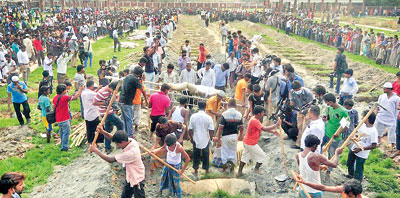Sunday Times 2
Pope condemns ‘slave labour’ at Bangladesh factory
View(s):The pope has today criticised the ‘slave labour’ conditions at a Bangladesh factory which collapsed last week killing hundreds of workers – as a mass burial took place for dozens of unclaimed victims. Speaking at a private mass at the Vatican, Pope Francis said he was shocked by reports that some of the workers were living on 38 euros a month.
He said: ‘This was the payment of these people who have died … and this is called “slave labour”‘. Today, hundreds attended the traditional Muslim funeral and many more looked on from the roofs of nearby buildings as the 34 dead bodies – who were too battered or decomposed to be identified – were taken to the graveyard on flatbed trucks.

Mass burial: The bodies of 34 unidentified garment workers killed when the Rana Plaza building collapsed in Bangaladesh have been interred in a mass burial a week after the disaster
Police have now said that the death toll from the collapse has passed 400, with a total of 410 confirmed dead so far. As the bodies of the unclaimed victims were placed in the graves, men and boys recited a traditional Muslim prayer for the dead. Workers at the cemetery have dug several long rows of graves as authorities expect to bury scores more unidentified bodies in the coming days.
Five garment factories were housed in the illegally constructed Rana Plaza building that collapsed last week, five months after a fire killed 112 people at another clothing factory. The tragedies exposed the unsafe conditions plaguing Bangladesh’s garment industry, which supplies many European and American retailers.
EU officials are considering action including changes to Bangladesh’s duty-free and quota-free access to the giant EU market to ‘incentivise’ responsible management of the nation’s garment industry.
Pressure built inside Bangladesh as well, as a May Day procession of workers on foot, in pick-up trucks and on motorcycles wound its way through central Dhaka demanding safe working conditions and capital punishment for the building’s owner. They waved the national flag and banners, beat drums and chanted ‘Direct action!’ and ‘Death penalty!’.
From a loudspeaker on the back of a truck, a participant spoke for the group: ‘My brother has died. My sister has died. Their blood will not be valueless.’ Rescue workers expect the number of dead to rise because they believe many bodies are still buried on the ground level of the building.
There is confusion over how many people remain missing. The owner of the building, Mohammed Sohel Rana, is under arrest and expected to be charged with negligence, illegal construction and forcing workers to join work, which is punishable by a maximum of seven years in jail.
Protesters demanded capital punishment for Rana, 38, a small-time political operative with the ruling Awami League party.
‘I want the death penalty for the owner of the building. We want regular salaries, raises and absolutely we want better safety in our factories,’ said Mongidul Islam Rana, 18, who works in a different garment factory.
The Bangladesh High Court has ordered the government to confiscate Rana’s property and freeze the assets of the owners of the factories in Rana Plaza so the money can be used to pay the salaries of their workers. Rana had permission to build five storeys but added three more illegally. When huge cracks appeared in the building a day before its collapse, police ordered an evacuation, but Rana told tenants it was safe.
The next day, a bank and some shops refused to open but factory managers told their workers to go back in. Hours later the building came down in a heap of concrete. Rescuers estimate the building turned into 600 tons of rubble, of which 350 tons have been removed.
© Daily Mail, London
Follow @timesonlinelk
comments powered by Disqus




















